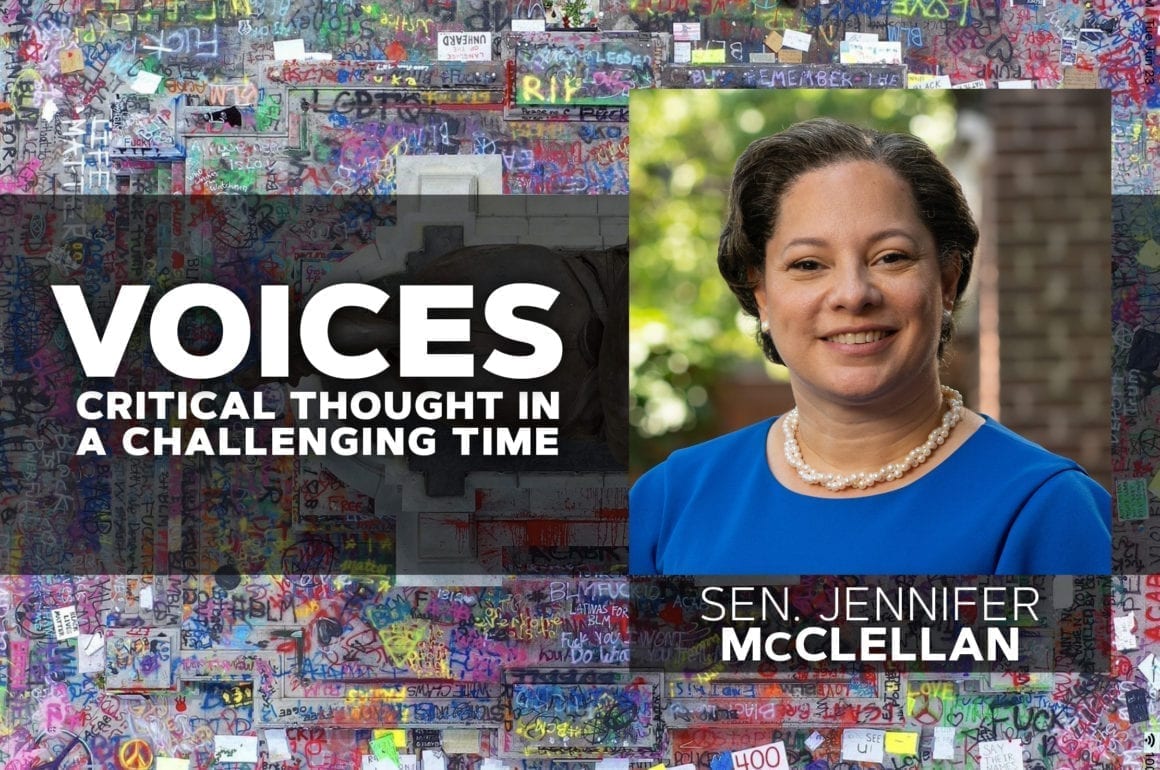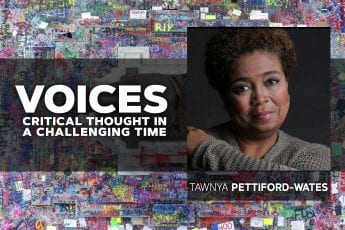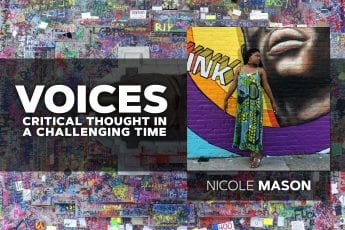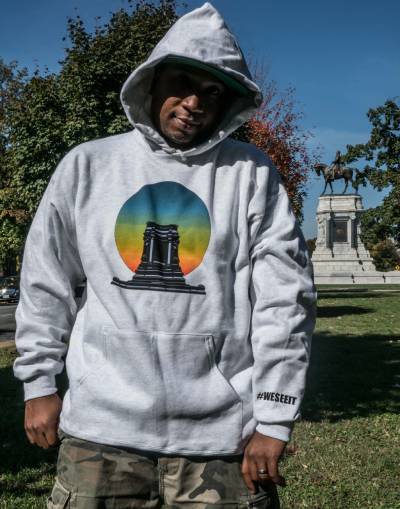VOICES: TAKING ACTION ON SYSTEMIC RACISM BY SEN. JENNIFER McCLELLAN

Systemic racism is not a new term. It is well known and commonly discussed within and around communities of color. These conversations were once held in “the back of the house” to avoid upsetting or creating discomfort. Periodically, these conversations burst through the front doors and sat right down at the dining room table for Sunday dinner, such as when Emmett Till was murdered, or Bull Connor turned firehoses and police dogs on peaceful protestors. George Floyd’s murder and the resulting protests have had the same effect in 2020.
The definition of systemic racism is systems and structures that have procedures or processes that disadvantage non-white people. I won’t spend a lot of time and characters defining all the ways in which
Black, Brown, and indigenous people have been brutalized and discriminated against over the 401-year complex and often painful history of this nation.
Last fall, I had the honor of speaking at the National Town Hall for the Congressional Black Caucus Foundation’s Annual Legislative Conference. During that forum, I recounted how, since Emancipation, every time African Americans gained social, political, and economic power, there has been a swift and violent backlash from the white power structure. Many of us knew that the so-called “post-racial” America heralded with the election of President Barack Obama was only a mirage. Although we hoped things would be different, we knew the backlash would come when the racism that is so embedded in the history of this nation reared its ugly head again.
And here we are. Each time we find ourselves in these moments, the unhealed wounds reopen. The pain and exhaustion of being an African American is a heavy cross to bear. But, the resilience, persistence,
and pride keep us moving. Because, as Dr. Martin Luther King, Jr. states, the arc of the moral universe will in fact bend towards justice. It just needs a little help from us.
That justice comes not from performative and surface gestures of unity, which are nice but do not move us forward. Real justice comes from the long, hard, and painful work of evaluating our complete history
and how it has shaped every system and structure from education, to housing, to criminal justice. With that understanding, we must eradicate the vestiges of racism upon which many systems were built. We
cannot remove inequity from our education system without understanding all of the ways non-white children have been prevented from learning: from keeping them in separate and unequal schools for nearly a century, to the disproportionate discipline system that pushes them out, to the criminalization of low-level behavioral issues today. We cannot fix housing issues and ensure an adequate supply of affordable housing if we cannot accept that the segregation and redlining of yesterday still very much
impacts the ability of Black and Brown people to rent and buy homes. And we cannot address police brutality until we admit the role white supremacy and racial bias has played since the creation of our law
enforcement and criminal justice systems.
“That justice comes not from performative and surface gestures of unity, which are nice but do not move us forward. Real justice comes from the long, hard, and painful work of evaluating our complete history
and how it has shaped every system and structure from education, to housing, to criminal justice.“
I became a legislator because I believe that our government can be a force for good and solving problems. I believe that if we work together, we can create that more perfect union the Founders spoke of, even though they were not speaking about me or other people of color.
To be honest, this summer, I got worn down.
We’ve seen a growing list of people killed for just being Black. In the midst of the COVID quarantine, the murder of George Floyd overwhelmed me, and I had to sit in the pain, sorrow, and helplessness of it all.
But, while weeping may endure for a night, joy comes in the morning. The joy is coming. In the face of such great turmoil, I find inspiration in what I’ve seen and continue to see in our community. People marching, minds opening and changing, our communities working together to advocate for
accountability, justice, and change in Virginia–now.
During this year’s special legislative session, we see some of the fruits of that labor. A primary focus of this session is police and criminal justice reform. Dismantling the systemic racism that is so much a part of our law enforcement and criminal justice systems cannot be done overnight, but during this special session, I have had moments of hope. I am proud to cosponsor several bills that will make a real difference:
- I have been working with Delegate Jeff Bourne and Senator Jeremy McPike (HB 5043 and SB 5048) to establish a Marcus Alert System; so that Mental health professionals will be first responders when 911 is called for someone during a mental health crisis.
- Senator Ghazala Hashmi’s SB 5035 will authorize civilian review boards to independently investigate police misconduct—with subpoena power and binding recommendations.
- Senator Mamie Locke’s SB 5030 will bring equity to policing by prohibiting no-knock warrants, like in the case of Breonna Taylor; banning chokeholds and strangleholds, like those used in the murder of George Floyd; creating a decertification procedure for law enforcement officers; prohibiting the hiring of officers who were fired or resigned during use of force investigations; and canceling Virginia supplemental funding for local police departments with disproportionate use of force incidents in their jurisdictions, and more. And if any police officer violates the clear restrictions in the bill, he or she can be held accountable.
- Senator Joe Morrissey’s SB 5007 will restore equity to the sentencing process by empowering the defendant to decide whether a judge or jury will establish his or her sentence.
- Senator Jennifer Boysko’s SB 5034 will restore equity in the prison system by expanding earned sentence credits for good behavior of those who are incarcerated and creating discretion for compassionate release for terminally ill or permanently disabled prisoners.
- Senator Louis Lucas’ SB 5029 will help end racial profiling by law enforcement. The bill limits the reasons they can pull a driver over and prohibiting an officer from searching a car on the ground of the odor of marijuana alone. And her SB 5024 will allow the Attorney General’s office to investigate law enforcement agencies engaged in patterns or practices violating civil rights.
While we have accomplished all we need to do during this special session, we will continue the work in the regular session come January.
As the leaves turn and the sun begins to set on this special session, we cannot rest. The 2021 session is quickly approaching and now is the time to engage with your legislators as we start to prepare for the 2021 General Assembly Session.
Yes, we all should exercise our right to vote on November 3rd – our very democracy and the soul of our nation are at stake. But we cannot stop there. We must continue to make our voices heard in this fight for justice and equity by educating, organizing, and mobilizing for legislative change.
It has become cliché to say that we are living in unprecedented times. But it is true. None of us have had the convergence of a pandemic, and economic crisis, and a social justice awakening hit us so hard at one time. But we will get through this. This time requires extraordinary leadership. Now is the time to be bold. We cannot retreat to our comfortable corners in our well-versed communities. We must continue to push forward even when it hurts, or we get tired, and even through our tears. We must continue until our ancestors’ dreams of justice for all are our children’s reality.






 The Cheats Movement is dedicated to hip-hop culture, politics, and community activity. We see our community different than most, therefore, #WESEEIT
The Cheats Movement is dedicated to hip-hop culture, politics, and community activity. We see our community different than most, therefore, #WESEEIT
Leave a Comment